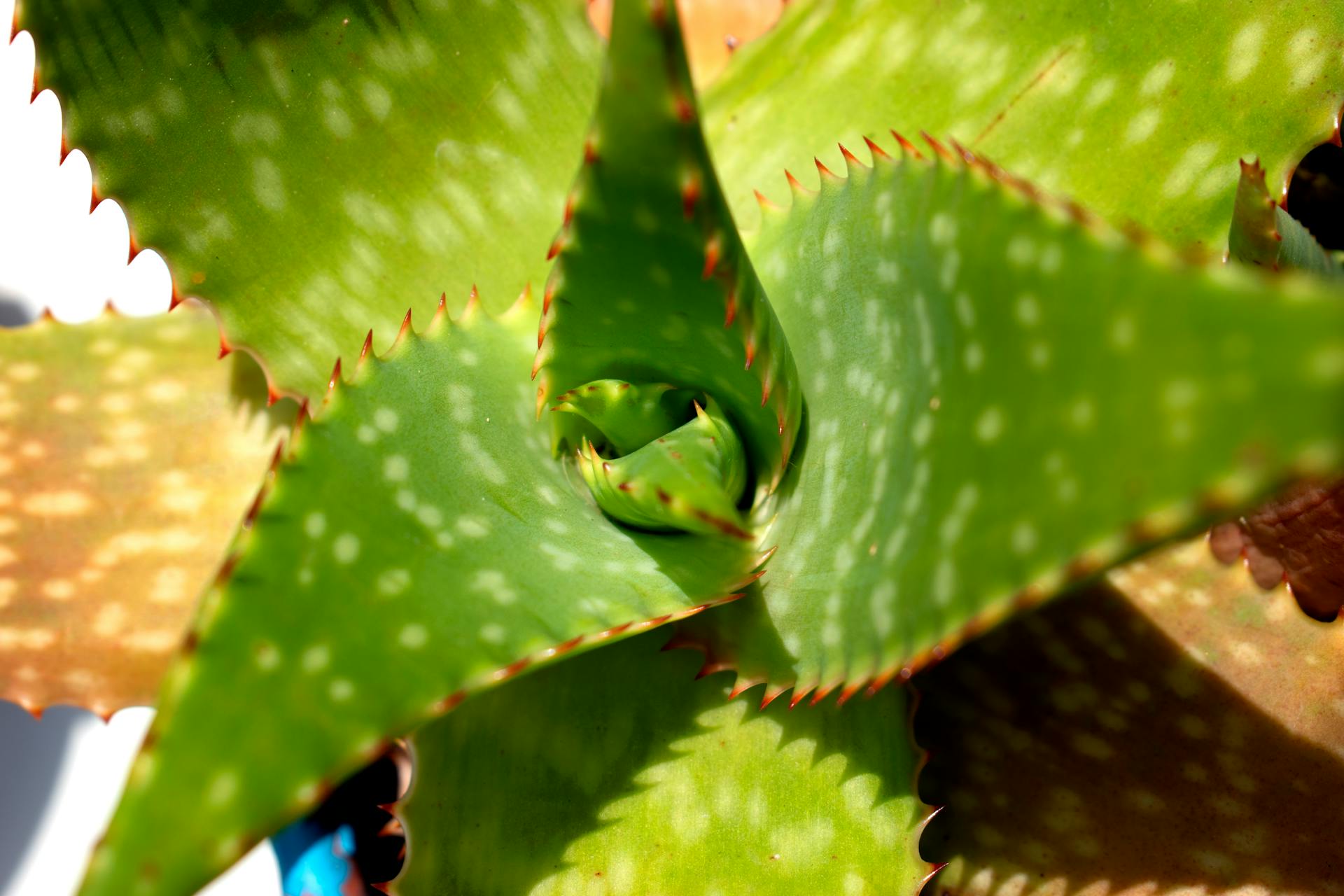
If your dog has eaten aloe vera, it's essential to act quickly to prevent any potential harm.
Aloe vera is toxic to dogs, and even small amounts can cause gastrointestinal upset, including vomiting and diarrhea.
If you suspect your dog has ingested aloe vera, it's crucial to contact your veterinarian or a pet poison hotline immediately.
The ASPCA recommends calling their 24-hour hotline at (888) 426-4435 for guidance on what to do next.
The severity of the symptoms will depend on the amount and type of aloe vera consumed, as well as your dog's size and sensitivity.
What Is Aloe Vera?
Aloe vera is a type of succulent plant that's native to Africa and Madagascar.
It's a member of the lily family, which might surprise you if you're used to thinking of aloe vera as a standalone plant.
Aloe vera has thick, fleshy leaves that store water, allowing it to survive in dry conditions.
This succulent nature makes aloe vera a low-maintenance plant that's perfect for indoor spaces.
Aloe vera plants can grow up to 3 feet tall and wide, but they can also be pruned to maintain a smaller size.
Some people use aloe vera as a natural remedy for skin irritations and burns, applying the gel from the plant's leaves directly to the affected area.
The gel is rich in vitamins and minerals, including vitamin A, C, and E, as well as calcium and potassium.
Is Hazardous to Your Pet
Aloe vera is hazardous to your pet, and it's essential to know the risks. Eating aloe vera can cause stomach upset, gastrointestinal distress, and more. The main active ingredient, saponin, can cause serious problems in your dog's system.
If your dog eats some whole aloe leaf by mistake, don't panic, but do keep an eye on him. He may vomit and have diarrhea, but if he ate a lot and is showing more severe symptoms, give your vet a call. The latex part of the aloe vera plant can cause cramping, diarrhea, nausea, and dehydration.
The latex in aloe vera is a powerful natural laxative if eaten, and it can cause dehydration from diarrhea. Aloe vera gel is often used in skin products and does have healing effects, but it should not be licked off by your dog.
If your dog has eaten aloe vera, look out for signs of toxicity, such as irritant dermatitis, stomach pain, refusing to eat, loss of interest in play and exercise, diarrhea, trembling, weak limbs, dark-colored urine, and vomiting.
Here are some common causes of aloe vera poisoning in dogs:
- Eating aloe vera plants
- Eating or being fed products with aloe vera gel, supplements or latex
- Constant exposure to aloe vera products in the environment
While aloe vera is considered mild to moderately toxic to dogs, it's still essential to keep an eye on your pet and prevent them from getting to the plant.
Preventing Canine Ingestion
You can't be too careful when it comes to your dog's safety around aloe vera plants. Keep the plant higher up than your dog can reach, such as on a high windowsill or a shelf.
Dogs aren't as agile as cats, so this should prevent them from getting to the plant. If your dog shows interest in the aloe vera plant, try locating it in another room or keeping it in a room where your dog isn't allowed.
You can also try training your dog to leave the plant alone, but this might not work for every dog. It's always better to err on the side of caution and keep the plant out of reach.
Using Aloe Vera Safely
The main active ingredient in aloe vera, saponin, is toxic to dogs and can cause serious problems in their system.
If your dog eats part of an aloe vera plant, it's best to take them to the veterinarian right away. The ability to lower blood sugar in dogs is especially dangerous, causing coma and death in some cases.
The latex part of the aloe vera plant contains a powerful laxative that can cause dehydration from diarrhea.
To use aloe vera safely, look for products that don't contain chemicals like 1,2-hexanediol, hydroxyacetophenone, and triethanolamine.
A good aloe vera product for dogs should be organic, 100% aloe vera, and free from preservatives, sweeteners, and flavorings.
Here are some key things to check for in an aloe vera product:
Finding a Good Product
Choosing the right aloe product for your dog is crucial. Look for products that are 100% aloe vera and organic.
Avoid products that contain chemicals like carbomer, 1,2-hexanediol, hydroxyacetophenone, triethanolamine, and disodium edta. These ingredients can cause irritation and are not safe for your dog.
You can check the ingredients at ewg.org if you're unsure. Always opt for products with no preservatives, sweeteners, or flavorings.
If you're looking for a product to eat or drink, make sure it doesn't contain aloin, especially when using it internally.
You might enjoy: Can Dogs Have Aloe Vera Water
Using Gel
To get the gel out of an aloe plant, use broad thick leaves so you've got lots to work with. You can easily avoid the yellow latex next to the skin by choosing the right leaves.
For best results, use the gel from the aloe plant to soothe your dog's skin. The gel is the most effective part of the plant for skin issues.
A different take: Dogs Eating Leaves
Risks of Using
Using aloe vera products can be safe for dogs if used correctly, but the whole leaves of the plant are toxic and should be avoided.
The leaves contain saponins, glycosides, and other compounds that are mildly toxic for domestic animals.
If a large amount of the plant is eaten, your dog may experience vomiting, diarrhea, loss of appetite, depression, and urinary changes.
Ingestion of large quantities may cause tremors, although this is rare.
Raw aloe vera gel taken directly from the plant is a safer option, but it's still crucial to use it in moderation and under the guidance of a veterinarian.
Liquid made from the extracts is another form of aloe vera that pet parents utilize, but it's essential to choose products specifically formulated for dogs.
If you suspect your dog has ingested aloe vera, take them to the veterinarian right away, as the toxicity can be fatal if not treated immediately.
The latex of the aloe vera plant contains a powerful laxative that can cause dehydration from diarrhea, so it's best to avoid it altogether.
Symptoms and Treatment
If your dog eats aloe vera, you'll want to know the symptoms to look out for. Abdominal pain and bloating, abnormal heart rate, and anorexia are all possible signs of aloe vera poisoning in dogs.
If your dog is experiencing aloe vera poisoning, treatment may involve decontamination through inducing vomiting and gastric lavage, as well as administering activated charcoal to bind to the aloe vera and prevent further contamination.
Symptoms of aloe vera poisoning in dogs can range from mild to severe, including vomiting, diarrhea, depression, tremors, and lethargy. Monitoring your dog's behavior and health closely is crucial in determining the best course of treatment.
Here are some common symptoms of aloe vera poisoning in dogs:
- Abdominal pain and bloating
- Abnormal heart rate
- Anorexia
- Breathing difficulty
- Coma
- Dark urine
- Depression
- Diarrhea
- Dilated pupils
- Drooling
- Head-shaking
- High body temperature (hyperthermia)
- Lethargy
- Muscle twitches, spasms, or weakness
- Nausea
- Seizures
- Skin irritation (bumps, flaky skin, and hair loss)
- Tremors
- Incoordination
- Vomiting
- Weight loss
Symptoms
Symptoms of aloe vera poisoning in dogs can be quite alarming. Abdominal pain and bloating are common symptoms, as well as abnormal heart rate and anorexia.
A dog may experience breathing difficulty, coma, dark urine, depression, diarrhea, dilated pupils, drooling, and head-shaking. High body temperature (hyperthermia) and lethargy are also possible.

Muscle twitches, spasms, or weakness can occur, along with nausea and seizures. Skin irritation, including bumps, flaky skin, and hair loss, is another symptom. Tremors and incoordination can also be present.
Acute aloe vera poisoning typically occurs when a dog consumes a large amount of aloe vera or a product containing aloe vera or latex. Chronic aloe vera poisoning occurs when a dog is exposed to aloe vera plants or products from the plant in small amounts over a period of time.
Here are some common symptoms of aloe vera toxicity in dogs:
- Vomiting
- Diarrhea
- Depression
- Tremors
- Loss of appetite
- Malaise
- Lethargy
- Urine color changes
Other signs of aloe vera toxicity include irritant dermatitis, stomach pain, refusing to eat, loss of interest in play and exercise, and dark-colored, red or orange urine. Weak limbs and problems standing can also occur.
Diagnosis
Your veterinarian will do a complete physical examination, including a vision and hearing check, a neurological exam, body temperature, blood pressure, weight, heart rate, oxygen level, and respiration rate.

They will also get some radiographs (x-rays) of your dog's abdomen and chest to look for damage or any indication of ingested plant material.
A complete blood count (CBC), blood gas measurement, biochemistry profile, electrolytes, urinalysis, and fecal examination will be done to check for lower than normal red blood cell count, low glucose level, and decreased electrolyte levels.
If necessary, an ultrasound and CT scan may be performed for a more detailed look at your dog's abdomen.
Your veterinarian may also do an echocardiogram (ECG) to check your dog's heart muscular and electrical activity.
They will ask questions about your dog's history of health and the ingestion of the plant, such as the amount consumed and the time that lapsed between eating the plant and arriving for treatment.
A part of the plant or any other aloe vera items your dog has eaten should be brought to the veterinarian's office.
Blood work, urinalysis, and a complete examination will be performed to assess your dog's symptoms.
Diagnostic imaging studies may be ordered to take a closer look at the abdomen and chest areas.
The veterinarian will check your dog's blood glucose level for a drop in sugar, and their electrolyte levels.
Treatment

Treatment for aloe poisoning in dogs typically involves decontamination to remove the toxic substance from the dog's system. This can include inducing vomiting and performing a gastric lavage to clean the dog's stomach.
Activated charcoal is often given to bind to the aloe vera and promote excretion through the bowels. The goal is to prevent further contamination and absorption of the toxic substance.
IV fluids and oxygen therapy may be administered to keep the dog hydrated and stable. This helps to restore electrolytes and glucose levels, which can become imbalanced due to the purgative properties of true aloe.
Your veterinarian may choose to perform gastric lavage instead of inducing vomiting, depending on the dog's situation. This involves inserting a tube down the esophagus and into the stomach to flush out toxic contents.
Treatment may also include a bland diet, such as chicken and rice, to help your dog recover. Fresh water should be provided several times a day to encourage urination and support overall health.
The faster medical help is given, the better the chance for recovery. Monitor your pet closely and attend all follow-up appointments as scheduled by the veterinarian.
Frequently Asked Questions
What happens if a dog licks aloe vera gel?
If a dog licks aloe vera gel, it can cause vomiting, diarrhea, and low blood sugar due to the toxic chemical saponin. Seek veterinary attention immediately if you suspect your dog has ingested aloe vera.
How much aloe vera is too much for dogs?
For dogs, giving more than 1 teaspoon of Aloe Vera gel or juice per 10 pounds of body weight daily can lead to diarrhea and other adverse effects. Exceeding this recommended dosage can cause serious issues, so it's essential to consult with a veterinarian for proper guidance.
Featured Images: pexels.com


